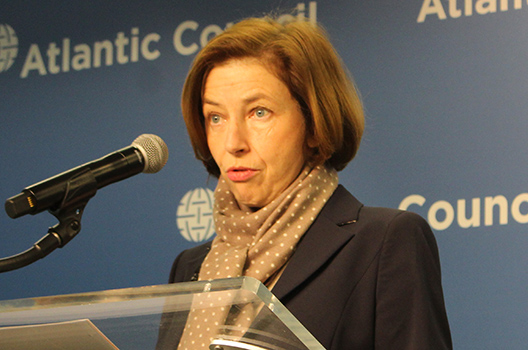Do France and Germany Speak for Europe on Defense?
There seems to be a persistent assumption in Paris and Berlin that the two largest states in Europe speak for Europe on defense.
President Macron is clearly committed to this notion and his calls for a true European Army really are reduced in large part to the relaunching of the Franco-German initiative and projects like the Future Combat Air System.
Chancellor Merkel has certainly overseen the expansion of German power within Europe as the EU has expanded and has persistently downplayed the importance of defense within the overall evolution of Europe.
President Trump has provided a useful foil to pose the need for greater “European autonomy” to deal with defense, given American uncertainties.
What seems to be neglected in all of this is less Trump than Putin, something not missed in the Nordic region or what used to be referred to as Eastern Europe.
But do France and Germany really represent Europe on defense and its future?
Such a claim made in Berlin and Paris overlooks the situation of the most significant defense player in Europe, namely, the United Kingdom.
The struggle over Brexit continues and the uncertain relationship of Britain to the continent will certainly affect the future of the defense of the European continent.
Already it is clear that a post-Brexit British defense policy is focused on national defense and the UK’s role on the flanks, rather than on the continent.
This would highlight key changes which can happen in Germany with regard to continental defense.
And what is happening there?
We learn from recent press pieces that the very modest increases proposed by Germany are perhaps overall optimistic.
We also learn that Trump is used once again as the crutch to not deal with what is your national interest and certainly in terms of projected European leadership on defense.
Ms. Merkel publicly pledged last year to increase German military expenditure to 1.5% of gross domestic product by 2024 and bring it closer to the 2% level members of the North Atlantic Treaty Organization have set themselves as a target. The promise followed mounting and increasingly overt pressure by Washington under Mr. Trump.
Berlin currently spends about €43 billion ($49 billion) or over 1.2% of GDP on defense. Under the new budget plan, unveiled by the finance ministry Monday, the spending would rise to 1.37% of GDP next year, but then decrease again to 1.33% in 2019, 1.29% in 2022 and 1.25% in 2023.
The draft budget includes €44.7 billion in spending for the Defense Ministry, well under the €47.2 billion Defense Minister Ursula von der Leyen had requested—and communicated to NATO—according to lawmakers who had seen the draft.
“The commitment we have made to NATO states that spending should reach 2% if the budget conditions allow for it. We haven’t abandoned the target but it remains a challenge that the federal government wants to master,” said a senior government official.
The same article notes that “Berlin is pushing for Europe to chart a more independent geopolitical course.”
But clearly a strong defense capability is not part of that push from Berlin’s perspective.
Even more striking are the comments made by the current French defense minister in Washington, Florence Parly.
What always amazes me is that comments made in DC by a foreign visitor seem to be the only reality most journalists focus upon than that foreign visitor is in DC.
There is a bigger context, including the country they are from.
The current Macron government is decidedly unpopular and facing a significant internal set of challenges and threats.
No observer of France for a long time would expect a low growth country with significant domestic upheaval and losing its key European defense partner from the core of Europe to be able to lead a European defense effort.
Yet that is what the defense minister claimed as she went on a defense of European autonomy as the European trump card to play against the uncertainties of the United States in her speech to the Atlantic Council.
One searches in vain for a single mention of Brexit and how France is going to “lead” with their major defense partner on the exit ramp from the European Union.
To their credit, both the UK and French governments are working hard on ways to do so, but my point is simple — what does this have to do with a European Army or enhanced European sovereignty a la the EU?
And even more predictably she went out of her way to criticize the F-35 element of enhancing European deterrence and accusing Washington of pushing F-35 sales as opposed to supporting Article V.
One could point out that the F-35 coalition is largely the former F-16 coalition plus Britain.
So a little history lesson for the Minister might be necessary for her.
What are the prospects that France will build up its defense capability to defend Germany, for example?
France is relying on its nuclear force for the direct defense of France against any direct Russian threat.
How does that work out for Germany and its defense approach?
Clearly, missing from all of this of course are the “bad” European states like Poland which face Russia directly.
Poland is often accused of not following “European values” but last I looked they are sandwiched between those states practicing “European values” and the Russians who are a pure play authoritarian state.
If Germany fails to recover its military capability, it is very unlikely that it is part of an effort to lead Europe on defense.
The reality is that neither Germany nor France speak for European defense.
Full stop.
The leaders of direct defense in Europe are the Nordics, the UK and the struggling states East of Berlin.
For France and Germany to lead European defense, they need to deliver capabilities which can deter the Russians.
To play chess with Putin, you need to do more than simply become more energy dependent on him.

